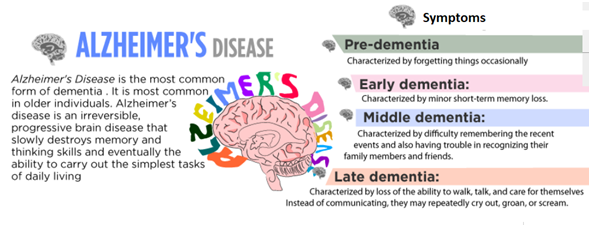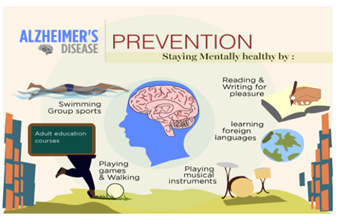

September 21 of each year is observed as World Alzheimer’s Day.
Context
September 21 of each year is observed as World Alzheimer’s Day.
About
What is Alzheimer’s disease?
- Alzheimer’s disease is an irreversible, progressive brain disease that slowly destroys memory and thinking skills, and eventually, the ability to carry out the simplest tasks of daily living.
- Alzheimer's disease is the most common form of dementia which is more common in older individuals.
- Dementia is a disorder characterized by serious loss of cognitive ability in a previously unimpaired person.
- Alzheimer is named after a German psychiatrist Louis Alzheimer in 1906.

What causes Alzheimer’s disease?
Scientists have not yet understood the exact cause of Alzheimer's disease. It is postulated to have multifactorial etiology like:
- Genetic:
- The Apolipoprotein E (ApoE) gene is implicated in Alzheimer’s disease. This gene has several forms. One of them, ApoE ε4, seems to increase a person’s risk of getting the disease.
- However, carrying the ApoE ε4 form of the gene does not necessarily mean that a person will develop Alzheimer’s disease, and people carrying no ApoE ε4 can also develop the disease.
- Scientists around the world are searching for other genes that may increase a person’s risk for developing Alzheimer’s disease.
- Environmental/ Lifestyle factors:Diseases like heart disease, stroke, high blood pressure, diabetes, obesity, hyperlipidemia etc. have also shown to be linked with the Alzheimer's disease.
What are the preventive measures?
There is no definitive evidence to support that any particular measure is effective in preventing. However, there are certain steps that could be taken which may help to delay the onset of dementia such as staying mentally healthy.
Recent Research:
- The scientists at National Brain Research Centre (NBRC) have identified the link between depleted levels of Glutathione in the brain and the Alzheimer’s disease.
- Antioxidant Glutathione exists in two forms i.e. Extended and Closed. According to the findings the closed form of Glutathione depletes significantly in those parts of the brain that are responsible for memory planning and decision making in case of Alzheimer’s Diseases.
- Monitoring Glutathione levels can offer a way to detect signs of disease and therapies can be devised to keep the illness at the bay.
- According to the scientists the damage can be prevented by giving a non-invasive glutathione therapy.



